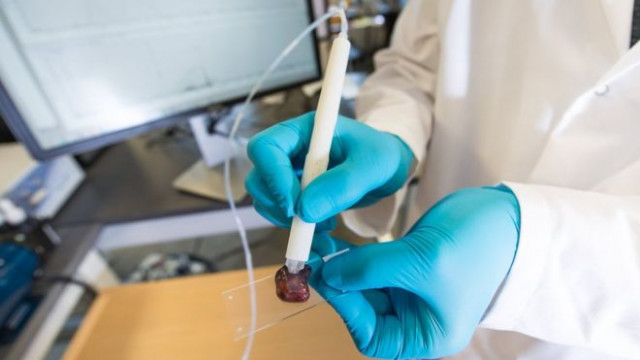'Pen' identifies cancer in just 10 seconds
The MasSpec pen is the latest attempt to improve the accuracy of surgery

PHOTO COURTESY: BBC
Science Translation Medicine published tests which suggest this technology is accurate 96% of the time. The unique metabolism of cancer cells is used as added advantage by the MasSpec pen.
Indian man with throat cancer kills colleague who made him start smoking
How it works
The pen releases a tiny droplet of water after it is touched onto a suspected cancer cell. Chemicals inside the living cells are sucked back into the pen after moving into the droplet.
Once the pen is plugged into it, a mass spectrometer is used to measure the mass of thousands of chemicals every second.
A chemical fingerprint is produced which tells doctors whether it’s a healthy tissue or cancer.
The challenge faced by surgeons is to determine the border between the normal tissue and the cancer but the boundary between a diseased and healthy tissue can be blurred in some tumours.
However, the pen can help doctors ensure that the cancer is not left behind.
There is a complication while removing the tissues because if too little is removed then the cancerous cells can grow into another tumour and if too much is taken then there is a chance of damaging the brain.
"What's exciting about this technology is how clearly it meets a clinical need. The tool is elegant and simple and can be in the hands of surgeons in a short time,” said Livia Eberlin, an assistant professor of chemistry at the University of Texas, Austin while talking to BBC.
Trials
As part of the study, this technology has been tested on 253 samples. The plan is to continue testing in order to refine the device before starting to use it during operations next year.
Currently the pen analyses a patch of tissue 1.5mm across but researchers have developed even more refined pens that should be able to look at a patch of tissue 0.6mm across.
The pen is cheap but the mass spectrometer is expensive.
“The roadblock is the mass spectrometer, for sure. We're visioning a mass spectrometer that's a little smaller, cheaper and tailored for this application that can be wheeled in and out of rooms,” said Dr Eberlin.
“Any time we can offer the patient a more precise surgery, a quicker surgery or a safer surgery, that's something we want to do. This technology does all three," said Dr James Suliburk, one of the researchers and the head of endocrine surgery at Baylor College of Medicine.
A team from Imperial college London have even developed a knife that can “smell” the tissue it cuts to determine whether it is removing cancer or not.
The MasSpec pen is the latest attempt to improve the accuracy of surgery though.
Kulsoom Nawaz diagnosed with throat cancer: report
A team at Harvard is using lasers to analyse how much of a brain cancer to remove.
"Exciting research like this has the potential to speed up how quickly doctors can determine if a tumour is cancerous or not and learn about its characteristics,” said Dr Aine McCarthy, from Cancer Research UK.
"Gathering this kind of information quickly during surgery could help doctors match the best treatment options for patients sooner,” she added.
This article originally appeared on BBC



















COMMENTS
Comments are moderated and generally will be posted if they are on-topic and not abusive.
For more information, please see our Comments FAQ